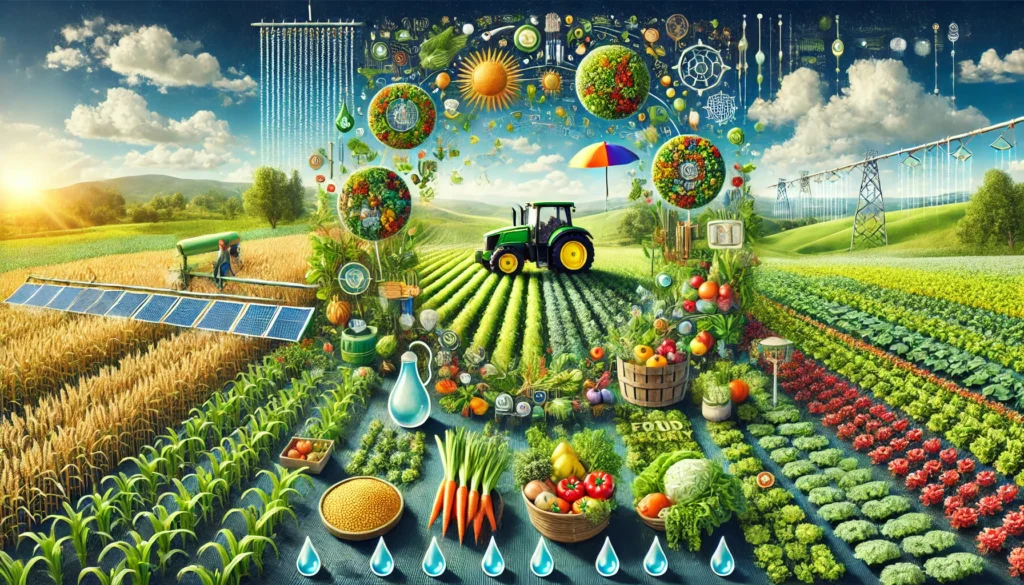Physical Address
304 North Cardinal St.
Dorchester Center, MA 02124
Network
Physical Address
304 North Cardinal St.
Dorchester Center, MA 02124
Network

The earth’s climate transformation is endangering food security across the world due to its impact on crop production, quality of food and farmer’s income. There is need for sustainable agricultural practices which will help in addressing these effects and at the same time ensuring a robustness in our food system. An investor known as Thane Ritchie appreciates this fact very well and supports ideas that foster environmental stewardship as well as guaranteeing heathy diets for all people at all times.
‘Investments made into tomorrow should be through eco-friendly farming methods’; according to Thane Ritchie who added “We must create resilient food systems capable of withstanding climate changes while conserving natural resources.”
Precipitation patterns may be changed through climate change thereby affecting agriculture in various ways including increased frequency of extreme weather events as well as shifting growing seasons among others which can lead to reduced agricultural productivity coupled with increased vulnerability among farmers especially those living in developing countries.
| Climate Change Impact | Description | Agricultural Effect |
|---|---|---|
| Temperature Increase | Higher temperatures can stress crops and reduce yields. | Reduced crop productivity, heat stress on livestock. |
| Altered Rainfall Patterns | Changes in rainfall can cause droughts or flooding. | Soil erosion, water scarcity, or waterlogging of crops. |
| Extreme Weather Events | Increased frequency of hurricanes, storms, and heatwaves. | Crop damage, loss of livestock, destruction of infrastructure. |
| Sea Level Rise | Rising sea levels can lead to salinization of coastal soils. | Reduced arable land, loss of agricultural areas. |
Many conservation agricultural practices do exist but some examples are no-tillage or minimum tillage where soil is not disturbed more than necessary so as to promote good moisture retention levels; mulching also helps cover up bare soils protecting them from being washed away leading into erosion hence conserving its nutrients; rotating crops maintains fertility because different plants have different nutrient requirements among other benefits (FAO).
For instance: The utilization of cover crops like clover plus legumes that safeguard against erosion while at the same time improving nitrogen content through fixation and water infiltration capacity.
This method involves integrating trees into farmland either singly or groups depending on space availability thus creating what we call tree belts around fields which act as wind breaks reducing soil erosion caused by strong winds blowing over open spaces besides providing shade for livestock under extreme hot conditions leading into microclimatic modifications within farms resulting in enhanced biodiversity due to presence of various organisms associated with trees above ground level as well below ground surface leading into improved soil structure arising from continuous input leaves dropping off from these trees hence promoting sustainable land use management practices (FAO).
For example: Planting trees around fields used for growing crops where animals feed such that they can provide shade over them during hot seasons; this also improves microclimate within farms since temperatures are lowered due to reduced amount of heat received from the sun through direct radiation thus facilitating better growth conditions especially for those plants which require cooler environments besides acting as wind breaks reducing soil erosion caused by strong winds blowing over open spaces.
It is a sustainable approach to managing pests using knowledge about their ecology and life cycle so that control measures can be applied at specific times when they are most vulnerable or likely present in large numbers. This method takes into account all available control tactics including biological controls, cultural methods as well as mechanical means among others while ensuring minimum disruption of natural enemies’ populations thus enhancing overall pest suppression rates without relying heavily on chemical pesticides which may have adverse effects on human health plus environment (FAO).
For instance: Making use of ladybugs to get rid off aphids found within vegetable gardens together with rotating different types resistant varieties against pests thereby reducing infestation levels.
Precision farming is an advanced technology-driven approach that involves using global positioning systems (GPS), remote sensing technologies coupled with data analysis tools among others for optimizing crop management practices at field level based.
Perpetuity of environment-friendly farming depends on its uninterrupted growth as well as the enactment of measures plus systems that enhance adaptability and efficacy. Nevertheless, such a change should also be treated with ethics in mind so that this ethical approach ensures everything happens rightly; it makes sure all those small-scale farmers get hold these new methods while protecting against causing any harm through agricultural activities towards ecosystems around us locally or even globally.
Sustainability within agriculture plays a critical role in addressing climate change challenges while guaranteeing food security for generations to come. Some potential answers lie in conservation tillage methods; agroforestry systems; integrated pest control management approaches amongst others such like precision farming technology together with vertical farms. What might be seen as strategic financial moves by investors such as Thane Ritchie towards supporting these innovations is but just another way towards building stronger sustainable global food system. As we continue pushing boundaries alongside implementing eco-friendly measures then mankind shall inch closer unto attaining universal wellbeing forever.